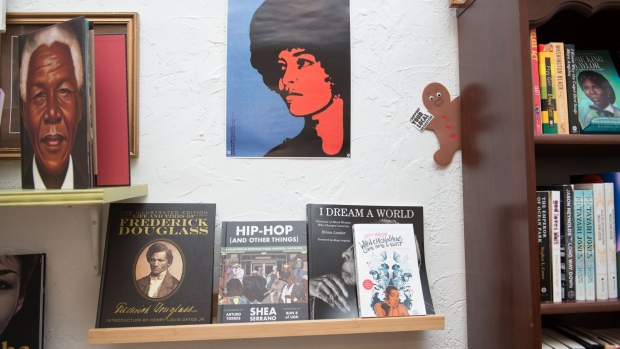May 2, 2024
Black Startups From The Pandemic Boom Now Struggle to Access Capital
, Bloomberg News

(Bloomberg) -- Three years after pandemic-era funding led to a boom in Black-owned businesses in the US, the cohort of entrepreneurs seeking to expand is facing the same barriers to capital that hampered generations of owners before them.
In 2023, just 32% of Black owners were fully approved for a loan or line of credit, compared to 56% of White entrepreneurs, according to a March report from the 12 regional Federal Reserve Banks. Black owners were also more likely to have to use personal funds to address financial challenges.
As government aid during the pandemic helped many Black households save and build wealth, it also provided seed money to start businesses, said Andre Perry, a senior fellow at the Brookings Institution. The recent entrepreneurial surge in the country was partly driven by Black women who created businesses to aid their communities, Perry said.
Ymani Wince, owner of the Noir Bookshop in St. Louis, Missouri, opened her storefront in May 2022 after a successful pop-up book sale earlier that year. She secured the rental space with the help of a new job and funds she saved during the pandemic. She also crowdfunded almost $18,000.
As she entered her second year in business, 30-year old Wince realized she’d need more capital to keep running the store, which she’d started in part to share Black culture and books written by Black authors. She attempted to get a loan through a bank and a small credit union, but was denied financing three times.
To fill the gap, Wince said she’s applying for small-business grants, and had to launch another round of crowdfunding in August when she began struggling to pay the store’s rent. She raised a little over $6,000 — which allowed her to pay back rent and left her with enough for two additional months of payments. Wince said she worries about the sustainability of her business, and is planning another round of crowdfunding in May.
“I’m just constantly looking for funding for my business,” Wince said. “I tried to put a lot of faith in grants because of how difficult going through a bank can be.”
Black-owned firms were more likely to be considered a high credit risk than any other demographic group, according to the regional Feds’ report.
About 44% of Black owners have had challenges accessing capital, according to an October survey from Bank of America Corp., with more than a third of those respondents saying they didn’t have a relationship with a lender. Some 35% said they don’t think they will ever have equal access to capital.
Angel Gregorio, 38, founded The Spice Suite, a Washington, DC-based store selling spice blends and condiments, in 2015.
She expanded in 2023 to open Black & Forth, a business strip in DC that offers Black business owners commercial space at below market rents. Despite her previous success, Gregorio said was denied funding from a bank to open Black and Forth. She instead sought capital from City First Enterprises, a nonprofit community based lender that gave her a $1.1 million loan.
“It is always going to be a challenge for Black business owners to be able to access capital,” Gregorio said. “No matter how many commas there are behind your revenue, there’s still the Black faces sitting across from them at the table that gives them pause and doubt.”
Just 45% of Black entrepreneurs received some form of funding from larger banks, according to the regional Fed banks’ report. They had more luck with smaller lenders, where 54% obtained at least some funding.
Black Americans have long been at a disadvantage when it comes to starting a business, largely due to systemic gaps in wealth that limit available capital. The average White family had six times as much wealth as the average Black family in 2022, according to Fed research. And though many companies pledged to direct more money to Black-owned businesses after the murder of George Floyd in 2020, corporate America has struggled to deliver on those promises.
“Many Black business owners, including myself, do not have access to the generational wealth many of our White counterparts have,” said Margaret Towolawi, owner of the Nurture Well Center in Shoreline, Washington. “Financial literacy is not something that was accessible to me as a young adult.”
Towolawi, 41, started SkinStatMD in July 2020, after the pandemic led her to re-evaluate working in a traditional medical practice. The business provides aesthetic and dermatology services with a specific focus on treating skin of color.
Towolawi, a physician, then opened her own primary care office, Nurture Well Center, in March 2021 and merged the two businesses.
She funded the startups using more than $10,000 of personal savings to avoid taking on a loan after paying off student debt. She is now looking for financial backing to expand her business.
Towolawi is considering working with her local credit union, Seattle Credit Union, which offers products designed for communities who’ve typically been underserved by financial institutions.
Perry, the Brookings fellow, said a business is often more likely to be successful once it’s able to bring on additional employees. Research shows Black-owned firms are more likely to be sole proprietors, and fail at faster rates than White-owned startups.
“If businesses are growing and hiring more workers, then you might see those businesses sustain themselves,” Perry said. “Some of them may scale to be able to take advantage of greater opportunities.”
©2024 Bloomberg L.P.


